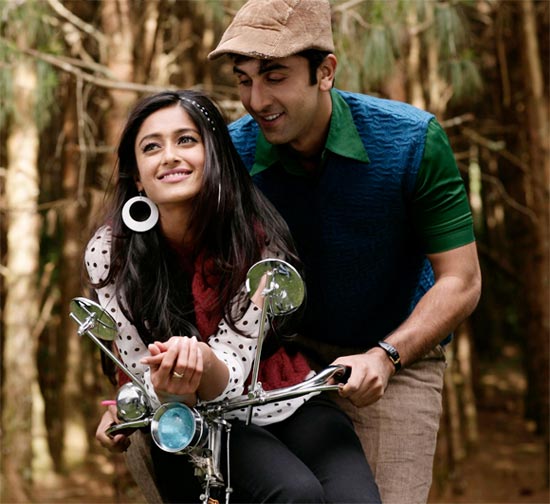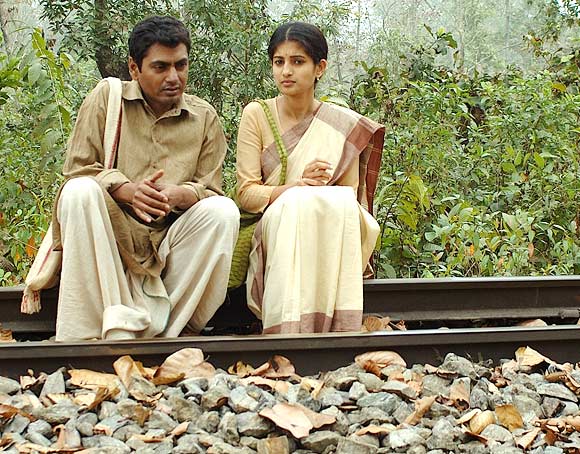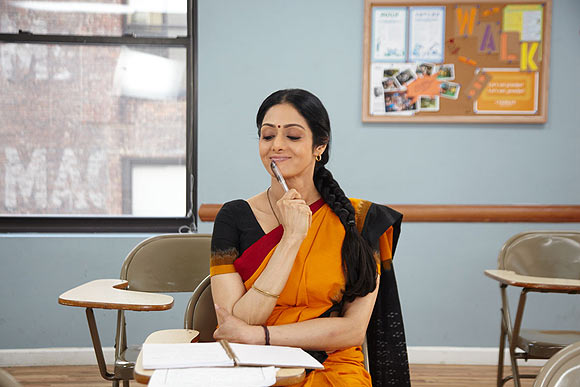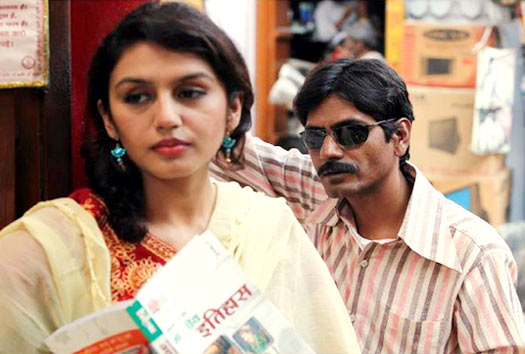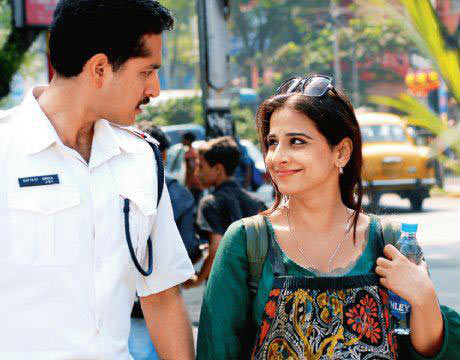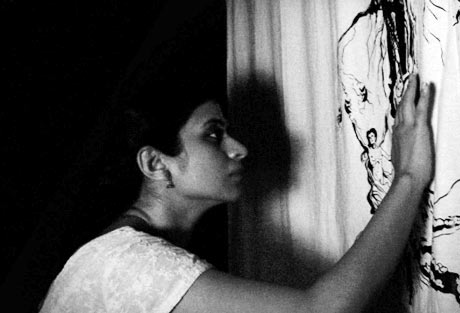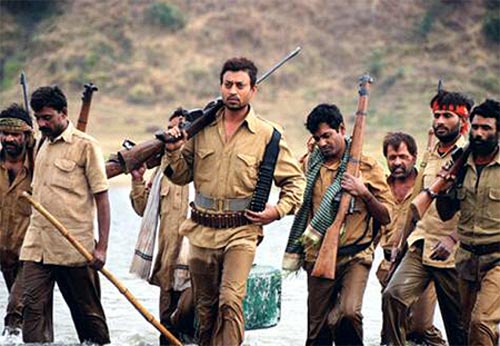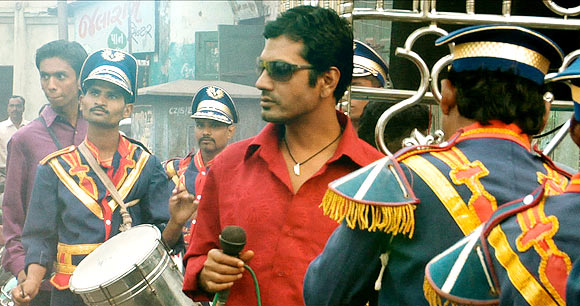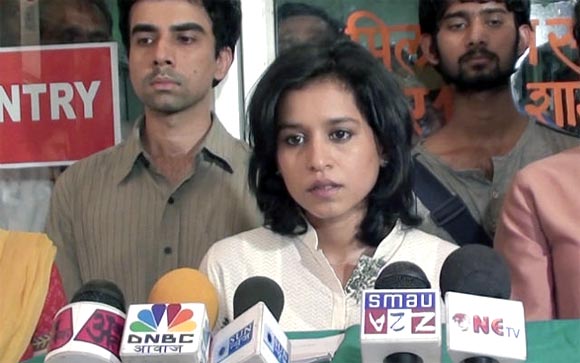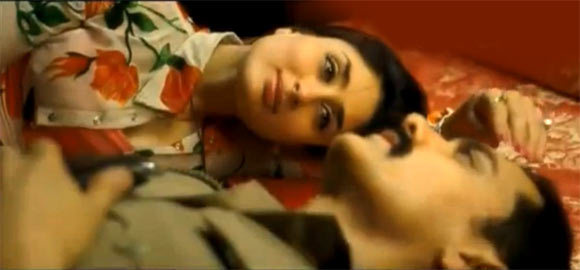 | « Back to article | Print this article |
Ten Most Memorable Movie Moments Of 2012
The year 2012 was a rich year for the Hindi film industry, thanks to its big hits.
There were also some good independent films that may not have had record-breaking box office collections but were much loved and praised by audiences.
Here is my list of special moments from some of the most acclaimed films of the year, in alphabetic order.
Barfi!
Anurag Basu's Barfi! got a lot of flak for lifting scenes from many sources -- many scenes were inspired from iconic filmmaker/actors like Charlie Chaplin, Buster Keaton and films like Singing in the Rain, The Notebook and Benny & Joon.
The film's general mood appeared to be inspired from the much-loved Audrey Tautou starrer French film Amelie.
All of this was really unfortunate since Barfi! looked and felt so good. The film left a smile on my face because of its genial nature and whimsical quality.
In spite of the controversy, what stayed with me were the lyrical songs from the film, especially Phir le aya dil, Aashiyan and Kyon.
One of the busiest composers in Bollywood, Pritam gives his best to Barfi!.
Read the review here
Chittagong
Los Angeles-based filmmaker Bedabrata Pain gave up his NASA job and put his heart and soul into narrating the true story of an Indian schoolteacher, who mobilised his young students to attack the British armory in Chittagong during the British rule.
Pain's film got delayed for a number of reasons, including a personal tragedy and the fact that Ashutosh Gowariker rushed to finish and release his own version of the Chittagong raid -- the insipid Khelein Hum Jee Jaan Sey.
Pain's Chittagong has some really good performances -- the wide-eyed Delzad Hiwale as Jhunku Roy carries the weight of the film, with support of veteran actors like Manoj Bajpayee.
Here again, music is the show-stealer. Shankar-Ehsaan-Loy's music set to Prasoon Joshi's lyrics weave magic in the film.
Particularly beautiful is the song Bolo na that explores the tender, delicate love between Nawazuddin Siddiqui's Nirmal Sen and Vega Tamotia's Pritilata Waddedar.
There are moments of silence when the two sit next to each other as we hear Shankar Mahadevan's deep melodious voice singing Bolo na in the background.
Also moving is the final song called Ishan -- a tribute to the director's teenage son who died in a freak accident during the making of the film.
Read the review here
English Vinglish
Gauri Shinde's English Vinglish proved to be a memorable comeback for Sridevi.
Apart from the interesting plot and some stereotypes -- the annoying salesperson at the coffee shop in Manhattan, the exaggerated and campy gay English teacher and Sridevi's husband (Adil Hussain) and onscreen daughter -- the film has a beautiful surprise too.
Sridevi's Shashi, who's flying to New York alone for the first time, meets a genial and distinguished man (ably played by Amitabh Bacchan) on her flight. Their interaction makes for a heartwarming sequence.
When Shashi cannot understand the English film playing on the screen in front of her, Bachchan readily makes up for the lack of Hindi subtitles by imitating different kinds of voices in the film.
Gangs Of Wasseypur 1 and 2
Anurag Kashyap's magnum opus Gangs of Wasseypur 1 & 2 are packed with a lot of energy, terrific performances, great writing, and many songs.
It is hard to pick a couple of special moments in the film, but there are two scenes that still make me laugh -- both featuring Faizal Khan (Nawazuddin Siddiqui) and Mohsina (Huma Qureshi).
In the first film, there is a scene that is inspired by real life events in Siddiqui's life when he went on a date with a woman. When he shared the story with Kashyap, the director decided to add that element in the film.
While on their first date by a lake, a shy Faizal sits besides Mohsina. They discuss her favourite colours and then Mohsina places her hand besides Faizal. He takes that as invitation to hold her hand.
The fiesty Mohsina lets him off with a mild scolding but it's highly amusing to see the fearsome Faizal weep silently.
Towards the beginning of the second film, Mohsina is sitting at a bookstore when Faisal approaches her, suggesting they go watch a movie.
When he promises her that he wouldn't take adavantage of her in the dark cinema hall, she says wryly, 'Apna ma ka saath hi jao na. Hamara kya zaroorat hai (Go with your mother then, why do you need me)!"
Kahaani
Sujay Ghosh's Kahaani is a smart thriller, with many strong supporting characters. Especially brilliant is Saswata Chatterjee's wonderfully realised Bob Biswas -- perhaps the creepiest character to come out of a Hindi film in a long time.
There are many special moments in Kahaani. But what has stayed with me is the look on the face of young inspector Rana (Parambrata Chatterjee) as he heads home one night in a tram, Kolkata's breeze blowing on his face. He has somewhat fallen in love with Vidya Bagchi (the luminous Vidya Balan). It is a quiet, sweet moment in the film.
Also, towards the end of the film a disappointed Bagchi suddenly decides to go alone in the search for her husband, as we hear Amitabh Bachchan singing Rabindranath Tagore's Ekla cholo re in the background.
Bachchan has sung for many films, but this is one of his best works.
Read the review here
Kshay
Karan Gour's Kshay is quite unlike any Hindi language film I saw this year.
This black and white thriller about a woman's obsession with a statute had a limited release in a handful of theatres in India but it is certainly a film worth watching on DVD.
Beautifully shot by Abhinay Khoparzi, much of the power of Kshay rests on Rasika Dugal's performance as a bored housewife, mourning her miscarriage as she becomes more and more convinced that an unfinished sculpture of Goddess Lakshmi will help her conceive again.
Dugal is a lovely, natural actress. Her face glows in the first half of the film and so her descent and near mental breakdown is frightening to watch.
Paan SIngh Tomar
Tigmanshu Dhulia's Paan Singh Tomar is a compelling story about a sportsman and Indian hero, who was wronged by his own country.
The moral center of the film is Irrfan Khan's deeply effective performance -- one of the best roles he has played in his prolific career.
Towards the middle of the film, Tomar stands in a corridor of an army barrack. He has just spoken to his mentor over the phone, a major in the army, when a young orderly places a packet of ice cream in his hand.
Tomar is deeply moved. With the camera on his partially lit and weathered face, he gives a wide smile, one hand wiping the tears flowing down his cheeks.
It is a beautiful, moving moment in the film. But the simple scene holds together because of Khan's performance.
Read the review here
Patang
Director Prashant Bhargava's visually stunning Patang is a lyrical tribute to the healing touch of the Uttrayan kite festival of Ahmedabad.
Chicago-based Bhargava spent a substantial time in Ahmedabad over a number of trips trying to get the rhythm of the city, its people and its love affair with kite flying.
Patang boasts of some very impressive performances -- especially by its lead actors, Seema Biswas and Nawazuddin Sidiqqui.
Among the most thrilling moments in the film are the kite flying sequences, set to the song Maaru Amdavad, edited like music videos by Bhargava himself. The video sequences capture the energy of the city and its residents during Uttrayan.
Patang opened at the Berlin International Film Festival in 2011 and also played at a couple of film events in India.
Earlier this year the film had its theatrical run in the US. It will be distributed in India soon.
Shanghai
Dibakar Banerjee took Vasilis Vasilikos' novel Z and customised it for an Indian setting. The result was a rare political thriller within the framework of Bollywood.
There are many strong elements in Shanghai, but much of its strength rests on its wonderful actors.
Emraan Hashmi -- giving his career best performance -- is fantastic as a scruffy video cameraman. His goofy and carefree self undergoes a major transformation as he realises that he had been a witness to a political scandal.
Abhay Deol's quiet South Indian IAS officer is also a revelation.
But I was particularly moved by the small yet very poignant role of Aruna Ahemdi, played by the lovely Tillotoma Shome (many of us still remember her as Alice from Monsoon Wedding).
Before the shoot, Banerjee asked Shome to view videos of Vinita Kamte, the wife of the slain cop Ashok Kamte, who died during the Mumbai terror attack in 2008.
Shome took that as a reference point and created one of this year's most heartbreaking performances in a Hindi film.
Read the review here
Talaash
Reema Kagti's Talaash is a mature film in the way it handles its adult characters -- conflicted, troubled souls who are searching for ways to get over their personal and professional turmoil.
The film is infused with a noir mood as KU Mohana's camera captures the dark side of Mumbai. The atmosphere in the film is aided by Ram Sampath's music compositions -- the haunting jazz score of Muskaanein jhooti hain (sung by Suma Sridhar), Vishal Dadlani's anthem Jee le zaraa, and my favourite Jiya laage naa, the lyrical duet by Sona Mohapatra and Ravindra Upadhyay.
My favorite moment in the film happens towards the middle when an emotionally and physically exhausted Surjan Singh Shekhawat (Aamir Khan) lies down on a bed in a seedy hotel. Next to him, is the gorgeous hooker Rosie (Kareena Kapoor).
They are attracted to each other but Shekhawat is a married man, although his marriage is going through a turbulent period.
As Shekhawat closes his eyes, Rosie gently strokes his forehead and his hair, until he falls asleep. It is a tender moment -- rare for a Bollywood film, where love and caring is never expressed in such a mature, yet delicate manner.
Read the review here
